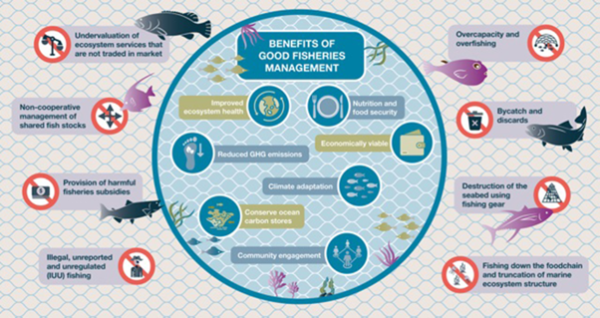Climate change is causing persistent, widespread, and significant impacts on marine ecosystems which are predicted to interact and intensify. Overfishing and associated habitat degradation have put many fish populations and marine ecosystems at risk and is making the ocean more vulnerable to climate change and less capable of buffering against its effects. In this paper the authors review how overfishing is disrupting the important role of marine vertebrates in the ocean carbon cycle, causing disturbance and damage to the carbon-rich seabed, and contributing to rising greenhouse gas emissions through fuel use. They discuss how implementing good fisheries management can reduce or remove many of the impacts associated with overfishing, including fish stock collapse, destruction of seabed habitats, provision of harmful subsidies and accompanying socio-economic impacts. Managing overfishing is one of the most effective strategies in protecting ocean carbon stores and can make an important contribution to climate mitigation and adaptation.
Graphic summarising the benefits of good fisheries management within the blue circle, and issues associated with poor fisheries management practices identified by red circles.
Better fisheries management contributes positively to climate mitigation and adaptation. As fish have an important role in the carbon cycle, and fishing practices may be reducing ocean carbon stores through fishing and by trawling carbon-rich seabeds, there is a strong climate change case for ending both overfishing and phasing out bottom trawling across the global ocean. Good fisheries management that prevents overfishing and the destruction of the seabed would not only help restore marine biodiversity and strengthen food security and livelihoods but would deliver multiple co-benefits through the ocean-climate nexus. These include enhancing the carbon sequestration potential of marine organisms, building the climate resilience of marine ecosystems and the communities that depend on them, and not allowing fisheries to deplete the carbon sequestration value of marine life. If fish stocks are allowed to recover, less fuel will be needed to catch the same quantity of fish, while the cessation of bottom trawling would simultaneously reduce GHG emissions, bycatch and ecosystem degradation.
To read the full article in Ocean Sustainability click here
